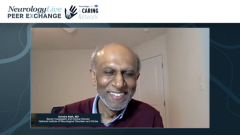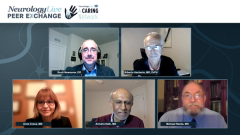
Viruses and Autoimmune Disease
Avindra Nath, MD, explains the importance of understanding virology when treating autoimmune diseases.
Episodes in this series

Scott Newsome, DO: I’m going to propose a question to Avi because he’s 1 of the preeminent virologists I know. Avi, why has it been so important throughout the years to study viruses in general? When we think about autoimmune diseases, and specifically MS [multiple sclerosis], how can this help put things together? Viruses may be priming the immune system, deviating someone’s immune system toward autoimmunity, or having a protective effect. Could you comment on that?
Avindra Nath, MD: Sure. Thank you very much for that question, Scott. When you’re a hammer, everything is a nail. When you’re a virologist, those are the most important things. The pandemic has made us wonder, “Why has nobody cared about viruses?” First, I want to congratulate Alberto on this fascinating work that he published. It’s such an important piece of work. People have tried to draw this association between EBV [Epstein-Barr virus] and MS for a very long time. You might remember that people showed lymphoid follicles in the meninges with EBV and then a lot of epidemiological association with EBV and lots of other viruses too. In MS, a lot of viruses have been implicated over the years, and EBV seems to be the 1 that continues to hold up. A lot of things fell by the wayside, like HTLV-1. You can remember a lot of these things over the years.
People love viral etiologies of diseases because you think that if there’s a viral etiology, maybe you can cure, or maybe the disease course will change after you treat the virus. For every disease, people have tried to look for transmissible agents, including for Alzheimer disease, Parkinson disease, and ALS [amyotrophic lateral sclerosis]. People used to take brain tissue they injected into macaques and chimps and all kinds of stuff to see if they can transmit it. The idea of slow viruses existed for decades and has been shown to be the case for Kuru disease and then for Creutzfeldt–Jakob disease. It was later discovered that it wasn’t the virus; it was actually an infectious protein.
But the idea that there may be viruses associated with neurodegenerative diseases continues. Herpesviruses have been associated with Alzheimer disease. That hasn’t been proven, but there’s a lot of work being done along those lines. These things can have long latent periods. You get infected, and as Alberto showed, you don’t develop MS the next day. There are long latent periods, and that makes it particularly difficult to draw those kinds of associations. But long latency can occur, and then it could be a trigger. Viruses can be a trigger. As you mentioned, Scott, they can trigger autoimmune phenomenon, and those autoimmune phenomena can take their own course and cause the disease. It could be either of those 2 possibilities.
Scott Newsome, DO: I have a Venn diagram that I show when I’m giving a talk on anything immunology related and the autoimmune process, that shows the perfect storm to set someone down the path of autoimmunity. At least for MS, the immune system is at center stage. Maybe there’s some genetic predisposition. We have identified hundreds of genes. Then we have the environmental risk, in which EBV has kept coming back, as you mentioned. It’s a new old kid on the block.
Transcript Edited for Clarity
Newsletter
Keep your finger on the pulse of neurology—subscribe to NeurologyLive for expert interviews, new data, and breakthrough treatment updates.















